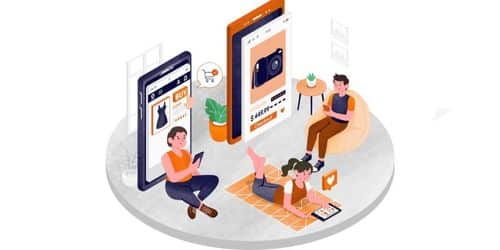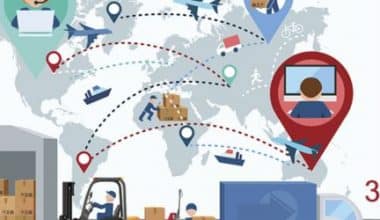The phrase “eCommerce personalization” refers to a group of procedures whereby an online store shows dynamic content based on customer information such as demographics, intent, preferences, browsing history, previous purchases, and device usages, such as whether the customer is shopping on a smartphone, tablet, or even a smartwatch. There are also examples, software, benefits, and trends of E-commerce personalization that are important for you to know. If you want to know about this, you should continue reading this article because the subsequent part will do justice to it.
E-commerce Personalization
Making your customer’s experience more customized is the primary goal of E-commerce personalization. Making it pertinent to each visitor to your website is something you can achieve throughout the entire user journey.
The ideal e-commerce personalization strategy aids in the most accurate definition of the behavior of your traffic during their shopping session. In other words, offering “tailored content” to your customers will increase conversion rates and foster stronger customer loyalty.
The ability to target prospects and consumers more precisely makes personalization crucial for e-commerce. Your visitors will have an easier time finding what they’re seeking when your website is personalized (and faster).
The Value of E-commerce Personalization
The process of e-commerce personalization involves displaying content and product recommendations to customers based on previously gathered data. Data on user intent, surfing patterns, prior purchases, demographics, and other information are included in this.
Because personalization guarantees that customers only receive content pertinent to them, e-commerce is dependent on it. Many clients have strong feelings about relevance; they love it when you offer it but detest it when you don’t.
As a result, personalizing the customer experience is crucial and, according to research from Segment, can result in over 40% of customers making repeat purchases.
Benefits of E-commerce Personalization
Why should brands choose to use personalization when selling products online? Personalization in e-commerce can make the difference between customers choosing your brand over the competition. Here are a few benefits:
#1. Better Sales Conversions
Customers don’t want the same experience as everyone else when they visit an online site to consider making a purchase. By displaying precisely what buyers are looking for before they make a purchase, eCommerce personalization can enhance conversion rates.
Brands may increase conversion rates for products that may not be popular with everyone by implementing strategies like product recommendations as a consumer is about to check out.
#2. An increase in brand engagement
You can increase engagement and how customers choose to interact with your business by learning where your customers prefer to shop and the kinds of things they are more likely to purchase. Because you present the things they want to see in the ways they want to view them, personalization encourages customers to interact with your business.
#3. More devoted customers
Personalization in e-commerce encourages client loyalty. They are more likely to display loyalty and continue to use your brand if you continuously demonstrate that you understand their expectations and how to deliver the experiences they desire.
#4. A better comprehension of customers
E-commerce personalization not only helps you enhance the consumer experience, but it also aids in your understanding of them. To give a better experience, personalization necessitates data collection from customers. Brands may learn where their customers are situated, the things they like to purchase, and even the ones they don’t.
#5. Advantage over rivals
E-commerce customization will probably provide you an advantage over your competitors if they don’t use it. Your brand can stand out from the competition and win over customers by using personalization. Customers occasionally can abruptly change their minds. However, people are more likely to stick around if you’re offering a more customized experience that they can’t get anywhere else.
E-commerce Personalization Examples
#1. Amazon
Amazon is a topic that can’t be ignored in any piece on personalization in e-commerce. Because they have such a vast amount of data at their disposal, Amazon excels at behavioral targeting, predictive modeling, and contextually relevant marketing.
Your full name, search term, average search time, previous purchase history, brand affinity, category browsing patterns, time of previous purchases, average spend amount, and other data points are all available to Amazon, which uses this data to understand customer preferences better, facilitate product discovery, and market indefinitely.
#2. Stitch Fix
According to Forbes, Stitch Fix is a data powerhouse and a fashion retailer. For millions of its consumers, the firm has continually managed the fantastic feat of personalizing its buying experience. Stitch Fix goes above and above to make personalized product recommendations.
#3. Yelp
Yelp turned 15 last year and currently has over 200 million user reviews. Users of the app see information about nearby businesses, user reviews of restaurants, and restaurant listings in a comfortingly familiar way. However, Yelp started to put more emphasis on customizing its suggestions last year.
Before it matches them with a business, the Yelp app allows users to enter dozens of details about their likes and dislikes, dietary choices, and lifestyle. For instance, Yelp is glad to suggest a restaurant you’ll enjoy if you love Japanese food, are vegan, and are seeking a pet-friendly dining area in Nolita.
#4. Starbucks
By emphasizing on developing one-on-one relationships with customers, Starbucks has been attempting to cut back on its mass-market spending.
By introducing an app-based customer rewards program in 2011, the company pioneered the loyalty program industry. Customers can use the app to order products and customize their drinks. Two years after introducing gamification as a hook to engage users in-app in 2014, Starbucks started customizing the games it put onto users’ screens.
#5. Forever 21
After declaring bankruptcy in 2019, this California-based apparel company has proceeded to reduce the size of its brick-and-mortar presence and is focusing more on e-commerce.
The fast-fashion company has now developed an international website to reach customers in Asia, the Asia-Pacific area, Canada, and Latin America. Personalization is a top focus for them, as should be expected.
E-commerce Personalization Software
Website text, product recommendations, pop-ups, emails, and other marketing messages can all be customized using personalization software by firms (such as online retailers).
They fully automated the process using AI and machine learning algorithms to collect customer data and discover what content produces better outcomes.
Some of this software are:
#1. WPForms
The best WordPress form builder is WPForms. You may construct contact forms, payment forms, registration forms, and many other forms for your website using its drag-and-drop builder.
Additionally, you may use WPForms’ potent personalization options to increase sales and provide better leads.
#2. Monetate
One of the most well-known solutions for personalizing E-commerce products is called Monetate. It delivers personalized product recommendations, sophisticated customer segmentation, and customization. Retailers are now able to customize in a variety of ways, including for every customer.
#3. Barilliance
This is the ecommerce personalization platform of the highest caliber. Throughout the consumer experience, Barilliance delivers personalization. Tools for cart abandonment and customer retention are also included, along with online personalization and product recommendations.
#4. Evergage
Evergage monitors user behavior on your website and mobile app so you can deliver the appropriate messages, incentives, and products at the appropriate times. Like other E-commerce customization solutions, the software enables you to customize product recommendations and content to increase engagement and sales.
#5. Dynamic Yield
Described as the “world’s first personalization technology stack,” Dynamic Yield is an enterprise-level E-commerce personalization platform.
To assist merchants in real-time online experience optimization, their platform comprises personalization, product recommendations, messaging, testing, and optimization. Well-known brands like Sephora, Hallmark, and IKEA use dynamic Yield to boost sales.
E-commerce Personalization Trends
#1. Headless Personalization
Headless architecture is a well-known element for efficient content management and designing digital experiences. But for many marketers, simply managing content is no longer sufficient. To take advantage of headless customization, many brands will resort to headless CMS platforms.
#2. The Use of Third-Party Cookies
Marketers have used third-party cookies to track website visitors and better understand consumer behavior. With the help of this information, they have been able to cater messaging and campaigns to the web browsing habits of various audiences while also offering customized adverts and content.
#3. Personalized AI-Driven Content
To sort through customer data, brands have already begun utilizing artificial intelligence. However, you can now use AI to make customized suggestions for customers by leveraging that data. The products recommended to customers will depend on their prior browsing habits, the popular products in their region, and the products that other users are currently looking at.
#4. Image Recognition Personalization
Images are among the digital assets that are utilized the most frequently in e-commerce, and image recognition will play an increasingly more significant role in e-commerce personalization in the future. We can improve the customer journey by using image recognition software, which is used to recognize particular colors and patterns when clients are browsing.
#5. Personalized Pricing
Personalized pricing is a further e-commerce personalization trend predicted to gain popularity. Each website visitor will receive a distinct fee under this pricing strategy based on their customer information.
For instance, users in different geographic areas might receive a range of pricing that better reflects the average cost of goods in those areas. As an alternative, clients who consistently purchase a particular brand could receive a discount in exchange for their patronage.
Which Is The Example Of Personalized Marketing In E-commerce?
Amazon, Yelp, Starbucks, and Stitch Fix are examples of E-commerce personalized marketing.
Why Is Personalization Becoming an Important Element in E-commerce?
Personalization fosters consumer loyalty, which can give you a competitive edge. Customers are more likely to return to e-commerce sites that show a personal touch because they believe the company cares about their preferences, buying habits, and likes and dislikes.
What Is Website Personalization?
Website personalization is the process of giving website visitors unique experiences. With website personalization, businesses may provide users with distinctive experiences catered to their requirements and preferences rather than offering a single, generic experience.
What Are Some Methods Of Achieving Personalization & Customization?
The primary means of achieving personalization and customization is the installation of cookie files on the client’s computer of the user.
Why Is Online Personalization Important?
A more personalized experience benefits customers. Your company can stand out from the competition by offering a customized, distinctive service, enabling you to forge stronger, closer bonds with your customers.
What Is The Difference Between Personalization & Customization
Designing or altering a product to better suit a customer’s wants involves personalization. When a customer manually alters an item to match their demands or specifications, this is called customization.
eCommerce Personalization FAQs
What is the e-commerce process for personalization?
E-commerce personalization is the process of giving customers personalized online interactions and experiences. The personalization process might consider a customer’s past purchases, browsing habits, location, language, and other details.
Why is customization crucial in e-commerce?
Customers become more devoted when you personalize your online store. They are more likely to show their allegiance and stick with your brand over the competition if you can continually demonstrate that you understand what is expected of your brand and how to deliver the experiences they want.
Conclusion
It would be best if you considered E-commerce personalization today. We have listed some examples and tools (software) that can assist you in creating your e-commerce personalization.
- SMS MARKETING: 10 SMS Marketing Examples to Stay in Touch With Customers via Text
- 9+FREE BUSINESS TEXT MESSAGING: Services in 2023 (Detailed Guide)
- 10+ BEST CREDIT CARD PROCESSING COMPANIES: 2023 List Updated!!!
- CAMPAIGN MANAGEMENT TOOLS: Free Tools and Application
- Free Email Marketing Software: Best 15+Picks For E-Commerce.






